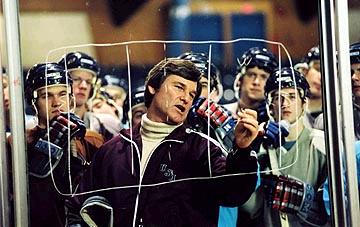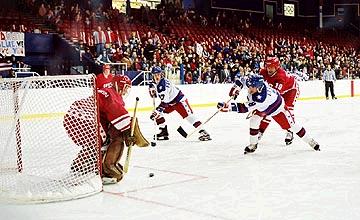

Miracle, plain and simple, is a cliched sports formula movie. That said, there is nothing wrong with formula, especially when it is done well, like it is here. Disney is forging ahead, creating its own little niche in sports movies, with films like The Rookie, Remember the Titans, and now, Miracle. All are based on actual events and all are about some sort of underdog overcoming amazing obstacles to win some sort of acclaim. To a lesser degree, all ignore some realities of sports (i.e. language) in favor of a more family-friendly film. It's forgivable, especially since each film is caveated with "based on actual events." Miracle is already a well-known story. In 1980, Herb Brooks coached a team of unknown hockey players to beat the Soviet Union in the Olympics, a monumental feat which caused sportscaster Al Michaels to ask "do you believe in miracles?"
A lot of credit goes to director Gavin O'Connor (Tumbleweeds, Comfortably Numb) and screenwriter Eric Guggenheim who manage to create a highly suspenseful and riveting film, although everybody and their mom knows what is going to happen. It even has every sports cliche imaginable, from arguing teammates, coming back from behind, motivational speeches, and injuries. O'Connor also made the decision to take a step back and place these events in context with other worldwide current events. Gas lines, student uprisings in Iran, and above all the Cold War are on the minds of everybody. The Soviet Team had a golden record in the Olympics, and beating them, especially with a team of virtual unknowns became symbolic of the American spirit. If the United States could do this, they could do anything. It makes the feel-good mood of the film relatable on a larger aspect.
The other great element of Miracle is Kurt Russell. As Russell (Dark Blue, Vanilla Sky) moves to a new point in his career, he is beginning to blossom. His role in Dark Blue and here as Brooks show a new side of Russell, that of intense, focused actor. Both roles give him the chance to play driven men, arrogant, brash, yet with a human side. Russell even perfects the awful Minnesotan accent of Brooks, who was a consultant on the film, and sadly died shortly after principal photography finished. He is the primary focus of Miracle; the glue that holds the team together. The United States wins because Brooks is after the team that can win, which isn't necessarily the best team. He drills them relentlessly, almost to the point of abuse. He is not their friend, he is their coach.
O'Connor then did what every sports movie director should do; cast players who can act instead of actors who fake playing. Every hockey player in Miracle played hockey at at least the college level, and the results show. O'Connor can zoom in and out of his thrilling hockey scenes, instead of cutting in on close-ups of the actors and long shots of stuntmen. The individual players are not the focus of the film, but O'Connor does take time to touch upon a few. The goalie (Eddie Cahill) is dealing with the death of his father, another guy (Michael Mantenuto) must deal with an unexpected injury, and other guys are dealing with old rivalries. By casting new faces and focusing on the basic story of their characters, it allows the audience to bond with the team under the sometimes tyrannical Brooks. As the team begins to feel more like a family, everybody watching is right there with them.
Miracle spends the bulk of its running time in training. It's an interesting choice, especially since one would think that the game itself (which, remember, was not for the gold medal) would be more exciting. Instead, O'Connor is able to hit the highlights of the game, and some of their other Olympic games, and the third act at Lake Placid is able to move very quickly. O'Connor realizes that yes, the game is exciting but if he were to look more at the characters, it would make the story more emotional. Thus, casting Patricia Neal (The Station Agent, Pieces of April) and Noah Emmerich (Beyond Borders, Windtalkers) are good choices. Neal, as Brooks' wife, is able to humanize Brooks, and Emmerich, as Asst. Coach Craig Patrick, serves as a foil to Brooks. Miracle is a long film, but it moves surprisingly quickly. And yes, as everybody knows, the United States hockey team did go on to win the gold medal, but the trip there sure is fun.